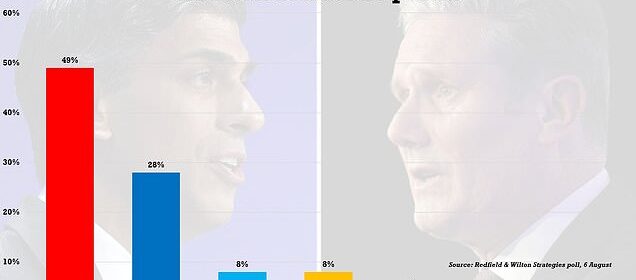Labour extends lead over Tories in Red Wall to 21 points

Labour extends lead in Red Wall to 21 points as poll finds more than two-thirds of voters don’t agree with Rishi Sunak’s plan to tackle cost-of-living crisis amid rising interest rates
- Keir Starmer’s party backed by 49% in Northern, Midlands and Welsh seats
Labour have extended their lead over the Tories to 21 points in key ‘Red Wall’ constituencies, a new poll has shown.
Sir Keir Starmer’s party are backed by almost half (49 per cent) of voters in the Northern, Midlands and Welsh seats.
The Conservatives are supported by less than one in three (28 per cent) voters in the same areas, the latest Redfield & Wilton Strategies survey found.
The poll of ‘Red Wall’ voters also found more than two-thirds (68 per cent) did not believe the Tory Government is taking the right measures to address the cost-of-living crisis.
Prime Minister Rishi Sunak has pledged to halve inflation by the end of this year, with the Bank of England having last week hiked interest rates to a level last seen in 2008.
Labour have extended their lead over the Tories to 21 points in key ‘Red Wall’ constituencies, a new Redfield & Wilton Strategies poll has shown
The Conservatives are backed by less than one in three (28 per cent) voters in the Northern, Midlands and Welsh seats
The poll of ‘Red Wall’ voters also found more than two-thirds (68 per cent) did not believe the Tory Government is taking the right measures to address the cost-of-living crisis
More than one-third (36 per cent) backed Sir Keir Starmer as the better PM over Rishi Sunak (32 per cent), although the Labour leader’s score was down six points
Labour were more frequently trusted than the Conservatives on every policy issue except on responding the war in Ukraine, on which the Tories led by 30 per cent to 27 per cent
Britain’s economy faces ‘stuttering growth’ due to higher interest rates
Britain’s economy will witness ‘stuttering growth’ over the next two years amid pressure from higher interest rates and increased unemployment, according to a think tank.
The National Institute of Economic and Social Research (Niesr) said in its main forecast that the economy will avoid a recession in 2023 but there is still a ’60 per cent risk’ of a recession at the end of 2024.
It predicted that UK GDP will increase by 0.4 per cent in 2023, representing a marginal improvement on its previous forecast in May.
But Niesr also downgraded previous predictions of 0.6 per cent growth next year down to 0.3 per cent after pressure from higher-than-expected borrowing costs.
As a result, the think tank has predicted it will be another year until UK GDP recovers to where it was before the coronavirus pandemic struck in early 2020.
It said higher interest rates, which it expects will peak at 5.5 per cent, will particularly weigh on growth prospects.
Redfield & Wilton polled 1,400 voters online on Sunday across 40 ‘Red Wall’ constituencies.
These are seats that were won by the Tories at the 2019 general election – as well as Hartlepool that was won by the Conservatives in a 2021 by-election – but have traditionally been held by Labour.
Labour’s lead over the Tories, when voters were asked who they would vote for at a general election, was up by three points compared to the last ‘Red Wall’ poll two weeks ago.
More than one-third (36 per cent) backed Sir Keir as the better PM over Mr Sunak (32 per cent), although the Labour leader’s score was down six points and was his narrowest lead over the Tory leader since 16 April.
When asked about specific policy areas, almost half (49 per cent) said they did not trust the Conservatives at all to deliver on immigration.
Labour were more frequently trusted than the Conservatives on every policy issue except on responding the war in Ukraine, on which the Tories led by 30 per cent to 27 per cent.
Sir Keir’s party held leads of more than 20 points over the Tories when voters were asked who they trusted the most to tackle poverty (40 per cent to 15 per cent), represent the interests of the North (38 per cent to 13 per cent), support the NHS (40 per cent to 16 per cent), and to invest in ‘left behind’ areas (38 per cent to 16 per cent).
Labour was also more trusted by ‘Red Wall’ voters to manage the economy (34 per cent to 25 per cent) and to handle immigration (29 per cent to 17 per cent).
The ‘Red Wall’ constituencies polled by Redfield & Wilton were Ashfield, Barrow and Furness, Bassetlaw, Birmingham Northfield, Bishop Auckland, Blackpool South, Blyth Valley, Bolsover, Bolton North East, Bridgend, Burnley, Bury South, Clwyd South, Darlington, Delyn, Don Valley, Dudley North, Gedling, Great Grimsby, Heywood and Middleton, Hartlepool, Hyndburn, Leigh, Newcastle-Under-Lyme, North West Durham, Penistone and Stocksbridge, Redcar, Rother Valley, Scunthorpe, Sedgefield, Stoke-On-Trent Central, Stoke-On-Trent North, Vale Of Clwyd, Wakefield, West Bromwich East, West Bromwich West, Wolverhampton North, East, Workington, Wrexham, and Ynys Môn.
Source: Read Full Article





